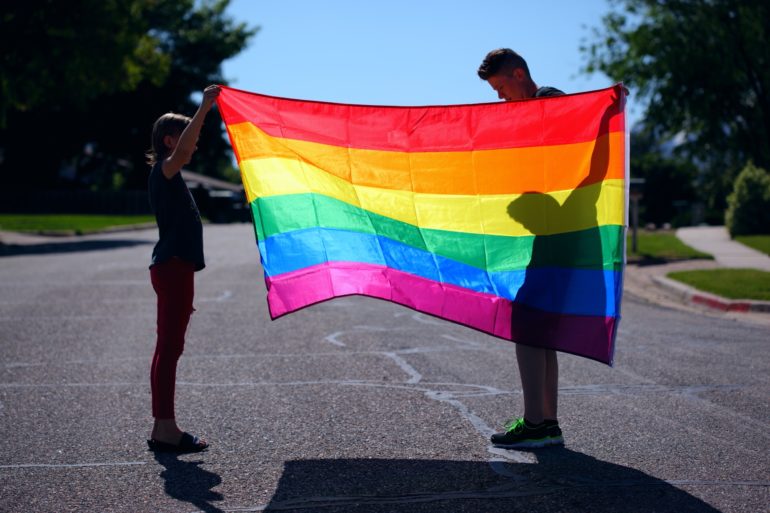On December 25th, a baby boy was born. Ten weeks later, sitting in the living room of Sarah and Michele’s townhouse in Thornhill, baby Tyler asleep in his car seat, Michele offers me home made muffins as she sips her coffee and eats her breakfast of toast and peanut butter. Sarah sits on the couch opposite us, Tyler at her feet. He’s sleeping peacefully, but they know that he will soon awaken, hungry and wanting to be changed. Their story reads the same as most new parents – thrilled at their first, probably only child, but somewhat sleep deprived and sometimes alienated from the rest of the world during the cruel winter months. What makes their family different from most of their neighbours in Thornhill is that Tyler has two mommies and no dad. When Michele and Sarah, six years into their relationship, decided that they wanted to become parents, they went shopping… for an anonymous donor. “It was like shopping at Sears,” says Michele. They were able to choose from a multitude of attributes and backgrounds, including whether the donor was bald or hairy, what his interests were and ultimately, they tried to choose as close to Michele, the biological mom’s background, as possible. Michele, 38 and five years older than Sarah, felt her biological clock ticking and wanting the opportunity to bear a child before it was too late, became pregnant through artificial insemination. When Tyler was born, he adopted Michele’s last name as by law, she is recognized as his mother – his single mother. Now, Sarah has to pursue legal avenues to adopt Tyler. Tyler doesn’t know the difference anyway. When he looks into the loving faces above him, he sees both as equally responsible for his care. Michele, the biological mom, had made it clear prior to conception, that she wanted to stay at home with Tyler until he went to school full time. She has for now, put aside her landscaping and gardening career to care for Tyler. She is, however, equally as comfortable in her role of mother as she is under the hood of her car. In fact, she loves doing home renovations, carpentry and mechanical tasks, all of which society has defined as male oriented roles. She is the more masculine of the two and jokes that the more petite Sarah just needs to sit on the couch and “look pretty.” Hardly. Sarah does enjoy coming home to great meals and time together, but has taken on the responsibility of continuing to work as a civil engineer to support their family. As Tyler wakes and begins to cry, Sarah picks him up and suggests that she take him upstairs to change his diaper before Michele feeds him. And when she returns and hands him over to Michele, I enquire as to how she may refer to her partner as Tyler gets older. In a more traditional family with mom, dad and baby, a mom might say “there you are, go to dad.” How, I ask, will an older Tyler differentiate between the two when he is calling for either of them separately. They have not decided on this completely, they say, but have considered the possibility of one of them adopting another culture’s name for mom. And what about when he is school aged and going to school with children, none of whom have lesbian mothers? Sarah and Michele acknowledge that there will be challenges along the way, but that because they are so comfortable with their relationship and have so much support from family, friends and neighbours, that they will find a way of helping Tyler if he feels different. One option would be to live in a part of Toronto where many of their lesbian friends and children reside. However, neither have any desire to leave Thornhill. Sarah grew up in the neighbourhood and they both feel comfortable in their community. Like Michele and Sarah, friends Dawn and Nicole have chosen to raise their 14 month old son, Noah, in Newmarket, where Dawn had lived most of her life. Although she and Nicole met while living downtown, they both felt that York Region was a “safer and cleaner” community in which to raise a child. The couple decided that Dawn would “go first” in conceiving a child and that Nicole would carry their second. Now, because of health concerns, Dawn may become the biological mom to their second child too, who they hope to conceive within the next couple of years. Dawn returned to her consulting work after a year’s maternity leave and Noah is taken care of at a home daycare with five other children. Neither Dawn nor Nicole felt that an explanation of their roles to the daycare provider was necessary. In answer to what he calls them, Dawn says that they “wanted Noah to have different names for each of us so that he would not be confused,” but didn’t know what. Eventually, Noah “solved the problem for us,” she says. He calls Dawn mama and Nicole mamba. “It’s very special,” they agree. And what about when Noah enters school in York Region?. He will know many downtown friends whose parents are both mommies, but maybe none or few at his local school. Nicole and Dawn see this as a non issue especially since he will be exposed to lots of different families such as single moms and dads, stepfamilies and grandparents raising their grandchildren. “I don’t think that a whole big explanation is needed other than families come in all shapes and sizes,” says Nicole. “So long as we show him love and that he’s okay and normal, he will be well adjusted” Sarah and Michele share their sentiments. They feel that if they can educate Tyler’s teachers and the community at large, and that if Tyler lives with love and acceptance, that he too will be just fine.
Lesbian couples raising children
